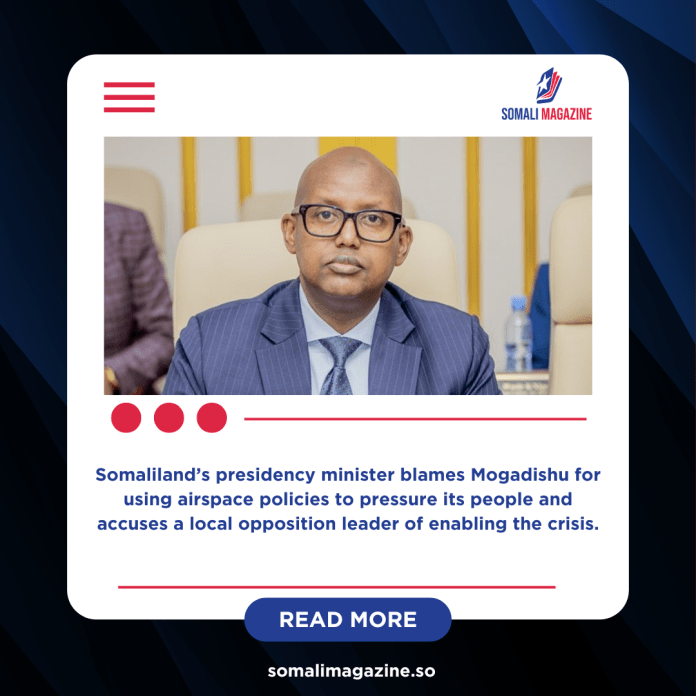Facebook Twitter (X) Instagram Somali Magazine - People's Magazine
The government of Somaliland has accused Somalia’s Federal Government of plotting a “war” over airspace control and air travel, claiming that the move is part of a political effort to punish and pressure the people of Somaliland.
Speaking to reporters on Saturday, Somaliland’s Minister of the Presidency, Khadar Hussein Abdi, strongly condemned what he described as Somalia’s attempts to interfere with Somaliland’s autonomy through airspace restrictions and new aviation policies. The minister said these actions were designed to frustrate Somaliland’s efforts to operate independently and to create unnecessary tension between the two sides.
“It is a shame and a disgrace for the Somali government and its people that, despite their repeated failures, they continue to harass Somaliland,” said Minister Khadar, also known as Khadar Looge. “They claim to advocate for a united ‘Greater Somalia,’ but in reality, their actions prove that they are only interested in undermining and punishing the people of Somaliland in every possible way.”
The minister also criticized Mahmoud Hashi Abdi, the current Chairman of the opposition KAAH Party, accusing him of being partly responsible for the current airspace dispute. According to Minister Khadar, Mahmoud Hashi transferred full control of Somalia’s airspace to the Federal Government when he served as Minister of Aviation and Air Transport during President Ahmed Silanyo’s administration in Somaliland.
“How did the Federal Government of Somalia get control of the airspace?” Khadar asked. “It was not taken by force — we handed it over to them. The person who signed that agreement was one of our own, the Chairman of the KAAH Party. That is why he cannot speak on issues related to airspace, water, or corruption.”
Khadar explained that the airspace was initially under international supervision before being handed over to Somalia’s federal authorities through the controversial agreement signed by Hashi. He blamed this transfer for the ongoing tensions and accused Hashi of acting against Somaliland’s interests.
Recently, Chairman Hashi stated that the airspace issue serves as a test for Somaliland’s leadership, a remark that drew sharp criticism from the government. Minister Khadar said such statements only fuel division and play into the hands of the federal government in Mogadishu.
The tension between the two governments escalated after the Federal Government of Somalia introduced a new E-Visa system. Under the new policy, all travelers without a Somali passport — including those from Somaliland — are required to apply for a visa before entering Somalia. Somaliland authorities have openly rejected this move, calling it an insult to their self-declared independence and another example of Somalia’s attempts to exert control over Somaliland’s affairs.
Somalia’s federal officials, however, maintain that they have full authority over the country’s airspace, borders, and immigration policies. They argue that the E-Visa system is a national security measure meant to improve travel management and data control, and it applies equally to all travelers.
Somaliland, which has declared independence from Somalia since 1991, continues to operate as a self-governing region with its own government and institutions, though it remains unrecognized internationally. The dispute over airspace and aviation control is just the latest in a series of clashes between Hargeisa and Mogadishu as both sides continue to disagree on sovereignty, governance, and international recognition.
For now, the disagreement has heightened political tension, with both administrations trading accusations. While Somaliland sees the issue as an attack on its autonomy, Somalia insists it is simply exercising its legitimate national authority. The standoff underscores the fragile relationship between the two governments and the deep-rooted mistrust that continues to shape their interactions.

